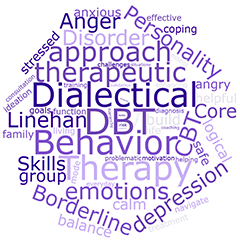Walking with a friend in the dark is better than walking alone in the light.
Dialectical Behavior Therapy (DBT)
 Dialectical Behavior Therapy (DBT) is a therapeutic approach that is based on the principles of CBT and Mindfulness. It was developed by Dr. Marsha Linehan as a way of helping people manage emotions in a healthier way. It can be used as a treatment for anxiety, depression, trauma/PTSD, and anger issues to name a few, as well as Borderline Personality Disorder (for which it was developed). It consists of learning four skill sets:
Dialectical Behavior Therapy (DBT) is a therapeutic approach that is based on the principles of CBT and Mindfulness. It was developed by Dr. Marsha Linehan as a way of helping people manage emotions in a healthier way. It can be used as a treatment for anxiety, depression, trauma/PTSD, and anger issues to name a few, as well as Borderline Personality Disorder (for which it was developed). It consists of learning four skill sets:
- Core Mindfulness Skills to help us stay in the present moment, so we can think more clearly;
- Emotion Regulations Skills to help us recognize when our emotions are controlling us rather than us controlling them, so we can mindfully bring ourselves back to the present moment;
- Distress Tolerance Skills to calm ourselves down and, again, bring ourselves back to the present moment;
- Interpersonal Relationship Skills to help us be mindful in our communications with others and have better relationships.
“Standard” DBT has a strict protocol which includes both a skills group, and individual therapy weekly. I am trained in DBT and the theory underlies much of the work I do with clients. I practice DBT-Informed Therapy because I don’t offer skills groups; although I have facilitated them in the past for adolescents and adults. I teach the skills in individual therapy sessions, tailoring them to what each client needs.
The skills helps us look at things in a more logical, less emotional way that helps us get our needs met. According to Webster’s the word “Dialectical” refers to using logic to dispel the tension between two opposing forces. Most things in the world are on a continuum rather than all good or all bad. Dialectical Behavior Therapy assists clients in coming back to the middle ground and stop thinking in absolutes.
In childhood we are dependent on those around us to keep us safe. For some of us the skills we developed were in reaction to chaotic, even unsafe environments. Sometimes as adults we use those same skills to get our needs met; when we are stressed, anxious, depressed or angry the tendency to do this is even higher. This is not always helpful. DBT can replace unhelpful, unhealthy coping skills by teaching us ones that are more conducive to building confidence and healthy relationships with family, friends, co-workers and bosses.
To learn more about DBT follow this link: https://behavioraltech.org/resources/